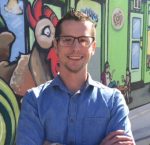
What excited you about Noma to inspire you to work there?
I chose to work there because it is considered the best in the profession. I’ve always been interested in the unknown, and this was the ultimate culinary unknown. I’ve read Noma’s books and have watched multiple documentaries on the restaurant and Rene Redzepi, the head chef. Rene and his team limit themselves to using ingredients found only in the Scandinavian area. This forces them to get creative and innovate techniques and flavor by juicing, centrifuging, fermenting, spinning, hanging, drying, and smoking to name a few. They have truly changed the game with their local sourcing and foraging, and the results are astounding. The dishes or “servings” are well balanced, playful, beautiful, and unique.
What types of jobs did you have while working there?
There are 4 different kitchens you can work in at Noma, and I was fortunate enough to spend time in all of them. All the interns start in the Production Kitchen which is run by two sous chefs. I was one of 12 interns in the production kitchen and my responsibilities included processing bulk raw products including herbs, flowers, proteins, moss, and many foraged ingredients. We would tackle all projects as a team, while maintaining Noma’s kitchen cleanliness standards.
For the next few weeks, I was in the fermentation Lab with Chef Lars Williams and Dr. Arielle Johnson. There I was responsible for running and maintaining the 7 different fermentation rooms. They were calibrated to different temperatures and humidity to promote the optimal climate for the different types of fermentations. It was probably the smelliest kitchen I’ve ever worked in, in the most delicious way. Here a lot of “trash” or “left-over” product was juiced, percolated, inoculated, and fermented into something complex and umami-filled.
My eighth week was spent with Michael Fitzner foraging with 3 other interns. Here we would trade our chef clogs in for waterproof foraging boots, and Michael would drive us out to remote parts of the Danish countryside, and we would cut, gather, collect, pick and pluck wild ingredients. This experience of picking these raw treasures from their natural state is a humbling and beautiful one. I remember eating my first Danish mulberry and thinking this is the most elegant thing I’ve ever eaten. All these ingredients would be brought back to the restaurant, properly sorted through, washed and then processed for service.
The next four weeks were spent in the Test Kitchen with Chef Thomas Frebel, Chef Beau Clugston, Chef Malcolm Livingston, and Chef Rene Redzepi. This was probably my favorite part of the internship. Creativity is such a tricky thing: there is no certain way to be creative, that’s the only thing certain about creativity. It’s one half experience/knowledge and one half ignorance. As Lars Ulrich said, to be creative is to be “unafraid,” and I’d have to agree. Here, Thomas led Beau and Malcolm through 16 hours of testing, tasting, and critiquing. I was responsible for organizing the sample products they received, keeping the kitchen clean, and aiding in daily mise en place, and any other support they needed. I got to clean my first sea urchin, try my first Danish mulberry, and sit in on the daily recaps and meetings.
My last week was spent in the Service Kitchen, the final step in which everything comes together on the plate and is served to the guests. Here, Chef de Cuisine Daniel Giusti ran a kitchen of 15 chefs. The kitchen was divided into 4 sections, each one headed by a Chef de Partie. Each section was responsible for an array of dishes. Everyone would always flock to the pickups though, so it didn’t really matter what section you were on; it was everyone’s responsibility to help one another out. The service was super intense, like super bowl game day intense, for both lunch and dinner service, all 5 days week.
What did you achieve through this stage, and how has this opportunity helped you to advance your skills?
This stage has opened my eyes to multiple new cooking techniques, many new philosophies of what food can be, and also a sense of self and purpose; a sense of what I find important, interesting, and delicious. I’ve formed lasting relationships and learned that it takes a team to be great. My overall dedication, concentration, commitment and work ethic has improved. My attitude and management has matured. I see myself in my cooks, and understand their frustrations and try to teach and mentor them through the tough times then we proactively work towards not repeating the same mistakes. I’ve been tapping into Austin’s raw materials through foraging. I then use new and old techniques to harness their flavor and add it to our larder. I’ve also developed great relationships with the farmers around me. They’re a great source of inspiration and mean the world to my cooking. I choose what I want for that day, it’s recorded in my requested amounts, picked, cleaned, and driven to Qui right before the doors open, everyday. It’s literally farm to plate, every night.
I’d like to thank Tehani for helping me through this entire experience as well as all the great chefs who head this fantastic foundation. Ment’or, thank you. From my humble heart, thank you for such an amazing once-in-a-lifetime experience--one that I never thought possible.